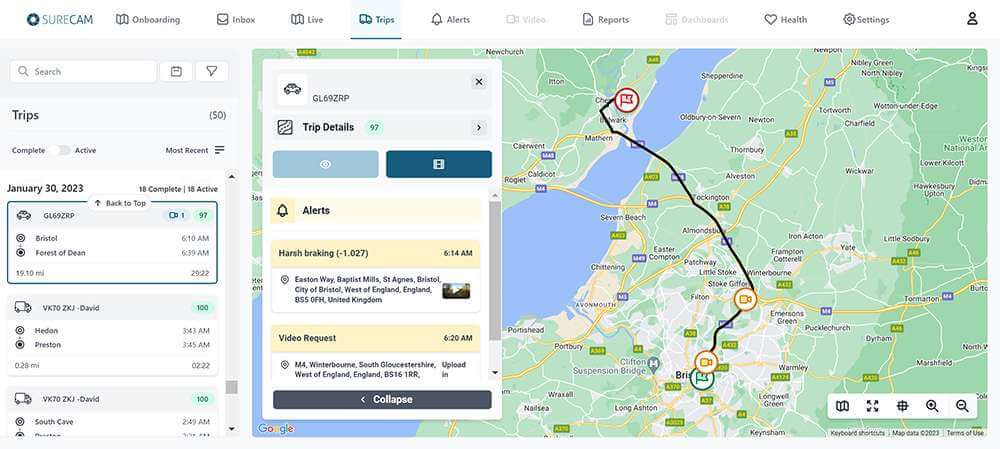Navigating Legal Considerations of Dashcams

Dashcams, once a novelty for scenic road enthusiasts, have rapidly become an essential part of fleet management in across a variety of industries. These devices, initially popular for personal use, now play a pivotal role in the commercial sector, particularly for fleet managers and owners. However, the implementation of dashcams goes beyond technological integration. It brings to the forefront a complex blend of legal challenges and responsibilities. 
The rise of dashcams demands a thorough understanding of the legal framework surrounding their use. Navigating through various privacy laws and state and federal regulations is not merely a compliance issue but a critical aspect of responsible fleet management. With legal implications ranging from fines to privacy breaches, the stakes are high.
For fleet owners and managers, this environment demands an informed approach to dashcam use. Grasping the nuances of legal compliance is critical—not just for avoiding legal repercussions but for ensuring that the deployment of this technology aligns with ethical standards and industry best practices. As dashcams become widely used in vehicles, understanding their legal implications is critical when it comes to harnessing their benefits and safeguarding against potential legal issues. Here’s what you need to know about the legal implications of dash cameras for your fleet.
Privacy laws and regulations
Privacy laws and regulations in relation to dashcams present a complex landscape that fleet managers must navigate with precision. These laws vary significantly, both domestically and internationally, making compliance a nuanced endeavor.
In the United States, the legality of recording conversations using dashcams hinges on state-specific laws. Most states operate under a 'one-party consent' rule, allowing recordings as long as one party in the conversation (often the driver) is aware. However, in states like California and Florida, the law requires 'all-party consent', meaning every individual being recorded must agree to it. This distinction is crucial for fleet managers to ensure adherence to state-specific legal frameworks.
Internationally, the scenario becomes more intricate. European Union countries, guided by the General Data Protection Regulation (GDPR), place a strong emphasis on personal data protection. This necessitates careful handling of dashcam footage, particularly when it contains identifiable information about individuals. The GDPR's influence extends to ensuring that any captured data is managed with stringent confidentiality and security.
Fleet managers must also consider the broader implications of dashcam usage. For instance, recording public spaces is generally permissible, but capturing footage of private properties can sometimes be construed as a privacy violation, depending on jurisdictional privacy laws.
Compliance with state and federal guidelines
In the U.S., compliance with state and federal guidelines is an essential aspect of legally integrating dashcams in fleet operations. These regulations, while varying from one jurisdiction to another, set the framework within which dashcams must operate to ensure both legality and safety.
At the federal level, guidelines mainly focus on ensuring that the use of dashcams does not impede safe driving practices. The Department of Transportation (DOT) and the Federal Motor Carrier Safety Administration (FMCSA) offer directives on how recording devices should be implemented in commercial vehicles. These guidelines typically cover the installation positions of cameras, ensuring that they do not obstruct the driver's view or interfere with vehicle operation.
State regulations are often more varied. Certain states have specific laws concerning the placement of dashcams on windshields or other parts of the vehicle. These are often framed within the broader context of view obstruction laws, aimed at maintaining unimpeded visibility for the driver. For instance, states like California have precise requirements regarding the size and position of dashcams on the windshield.
It’s important for fleet managers to stay on top of these diverse regulations. This not only involves understanding the federal and state-specific rules but also regularly updating policies and training programs to ensure that all fleet drivers are aware of and adhere to these guidelines.
Overall, compliance with state and federal guidelines is not just a legal obligation but a commitment to maintaining operational safety and efficiency. Staying informed and adaptable to these regulatory changes is key to harnessing the benefits of dashcam technology while upholding legal and safety standards.
CSA Scores in the transportation industry
The CSA score (Compliance, Safety, and Accountability) is an initiative by the Federal Motor Carrier Safety Administration (FMCSA), has become a cornerstone in the effort to enhance safety within the trucking industry. This scoring system is pivotal for fleets navigating the U.S. roads, where safety is paramount due to the significant volume of commercial traffic and the sheer scale of operations involved. With billions of products being transported annually and trucks clocking upwards of 45,000 miles each, the CSA score's role in promoting responsible driving and vehicle maintenance is more critical than ever.
The CSA scoring system is designed to improve safety standards for drivers, companies, and owner-operators. It holds these parties accountable against a set of criteria encapsulated in seven Behavior Analysis and Safety Improvement Categories (BASICS). These categories cover a wide range of operational and safety aspects, and the FMCSA's Safety Measurement System (SMS) compiles this data. The SMS is updated monthly, allowing for a dynamic and current reflection of a fleet's safety performance.
The BASICS that the CSA scrutinizes when assigning scores include:
- Vehicle Maintenance: This assesses the upkeep and condition of the vehicles, ensuring they meet safety standards.
- HOS Compliance (Hours of Service): Evaluates adherence to regulated driving hours to prevent fatigue-related incidents.
- Driver Fitness: Focuses on the qualifications and fitness of drivers, including their licensing and medical requirements.
- Improper Drug or Alcohol Use: Monitors violations related to the use of drugs and alcohol in the context of driving.
- Crash Records: Records of past incidents and accidents are reviewed to assess the risk level.
- Unsafe Driving Habits: Includes behaviors such as speeding, reckless driving, and other unsafe practices.
- Hazardous Materials: Scrutinizes the handling and transportation of hazardous materials.
The CSA assigns a score ranging from 1 to 100 (with 100 indicating the worst performance) to carriers, not individual drivers. This score is critical as it affects licensing, insurance rates, and the overall reputation of the carrier. Higher scores, indicating more violations or concerns, can lead to increased scrutiny from regulators and potentially higher insurance costs.
For fleets, managing and improving their CSA score is integral to maintaining efficient and profitable operations. It involves regular monitoring of driving habits, diligent vehicle maintenance, and ensuring compliance with all safety regulations. By focusing on these areas, fleets can not only improve their CSA score but also contribute to a safer driving environment for all road users.
Dashcams play a crucial role in helping fleets achieve better CSA (Compliance, Safety, Accountability) scores. By providing real-time visual data, these devices offer invaluable insights into driver behavior and road incidents. This footage can be used to monitor and improve compliance with safety regulations, a key factor in the CSA scoring system. For instance, dashcams can help identify and correct unsafe driving habits such as hard braking, speeding, or distracted driving, which are critical components of the Unsafe Driving BASIC category. They also serve as objective evidence in the event of an accident, contributing to accurate crash records.
Also, dashcams can assist in ensuring compliance with Hours of Service regulations by providing timestamps and location data. By leveraging the capabilities of dashcams, fleet managers can proactively address areas of concern, reduce violations, and ultimately achieve better CSA scores, leading to safer operations and potentially lower insurance costs.
Obtaining driver consent and ensuring transparency
Many of the legal requirements surrounding dashcams focus on driver privacy. But getting driver consent isn’t just a legal necessity in many jurisdictions—it also fosters a culture of trust and openness within a fleet.
The first step in this process is educating drivers about the purpose and function of dashcams. Clear communication regarding how the footage will be used is essential. This includes explaining that dashcams are tools for safety and accountability, rather than surveillance devices aimed at monitoring driver behavior. Such transparency helps alleviate any concerns drivers might have about privacy and reassures them about the ethical use of the technology.
In states where all-party consent is required for recording, fleet managers must establish protocols to obtain explicit consent from drivers, especially when audio recording is involved. This could involve incorporating consent clauses in employment contracts or having separate consent agreements specifically for dashcam usage. Ensuring that drivers understand and agree to these terms is vital for legal compliance and maintaining a positive work environment.
It's also important to regularly update drivers on any changes in dashcam policies or relevant laws. This ongoing dialogue not only reinforces transparency but also keeps the fleet compliant with evolving legal requirements.
Handling legal disputes with dashcam evidence
Let’s face it—no matter how careful your drivers are, accidents happen when you have a fleet of vehicles out on the road. Handling legal disputes with dashcam evidence requires a careful and informed approach, as this type of evidence can play a pivotal role in resolving conflicts and claims related to road incidents. When used correctly, dashcam footage can provide objective insights into events, thereby aiding in the fair resolution of disputes.
In the event of an accident or insurance claim, the impartial nature of dashcam footage becomes invaluable. It offers a factual representation of events, potentially exonerating drivers from wrongful blame or substantiating claims of negligent driving. However, the admissibility of this evidence in legal proceedings can vary. It's essential for fleet managers to understand the legal standards pertaining to evidence in their jurisdiction, including the authenticity and relevance of the footage.
Also, the handling of dashcam evidence must be aligned with privacy laws and consent requirements. In some cases, unauthorized or unethical use of dashcam recordings, especially those involving private conversations or images, could lead to legal challenges or be deemed inadmissible in court. This highlights the importance of adhering to lawful recording practices and ensuring the secure storage and handling of footage.
Fleet managers should also be prepared for situations where dashcam evidence may be requested during legal proceedings. It’s important to establish protocols for retrieving and sharing footage in a manner that upholds legal standards and respects privacy rights.
Best practices for legal and ethical use
Adopting best practices for the legal and ethical use of dashcams is paramount for fleet managers to ensure that they are maximizing the benefits of this technology while adhering to legal standards. Here are some key strategies to consider:
- Stay informed on legal changes: Laws and regulations regarding dashcams can evolve. It's crucial to stay updated on any changes in legal requirements, especially as they pertain to privacy, consent, and data storage. Regularly reviewing state and federal guidelines will help ensure ongoing compliance.
- Develop clear policies: Create comprehensive dashcam policies that outline the use, management, and access to footage. These policies should cover aspects like data retention periods, who can access the footage, and under what circumstances. Ensure that these policies are transparent and easily accessible to all drivers.
- Regular training for drivers: Conduct regular training sessions with drivers to educate them on dashcam policies, the importance of legal compliance, and how these devices protect both the driver and the company. Training should also cover the ethical aspects of using dashcams, including respecting privacy and handling data responsibly.
- Ensure proper installation and maintenance: Dashcams should be installed in a manner that doesn't obstruct the driver's view and complies with state regulations. Regular maintenance checks are necessary to ensure they are functioning correctly and capturing quality footage.
- Focus on data security: Implement robust data security measures to protect dashcam footage. This includes secure storage solutions, encryption of data, and protocols for transferring and sharing footage.
Leverage fleet dashcams and reduce legal risks with SureCam
In the transportation industry, legal complexities and the risk of litigation always loom large. SureCam’s fleet dashcams with GPS tracking are the ideal solution for fleet managers looking to reduce risk and safeguard profits. Our technology is not just about protecting assets and gathering evidence of road incidents; it's a comprehensive approach to monitoring driver behavior, enhancing safety, and driving operational efficiencies, all within the legal framework.
SureCam combines the power of GPS tracking and video into one seamless fleet operations management solution, putting fleet managers in the virtual driver’s seat of every vehicle in the field. This dual capability provides an unparalleled advantage: real-time, in-field information that is crucial for running a smooth operation. In today's environment, where operations managers grapple with myriad challenges daily, SureCam offers the insights needed to make data-driven decisions that positively impact the bottom line.
The current state of litigation in the commercial vehicle sector underscores the importance of being prepared. Aggressive litigation tactics, often targeting assets beyond insurance limits, make it imperative for businesses of all sizes to be vigilant. SureCam's solution offers the peace of mind that comes from knowing you're equipped to handle any situation, backed by evidence that is both reliable and legally compliant.
SureCam's fleet dashcams with GPS tracking represent more than just a technological solution; they embody a commitment to safety, compliance, and operational excellence. Embrace the future of fleet management with SureCam—where legal compliance, safety, and efficiency converge to drive your business forward. Check out our comprehensive dashcam buyers guide and book your free demo today.

Book a demo today!
SureCam offers GPS vehicle tracking, live video, and real-time alerts for efficient fleet management. Get a Demo


